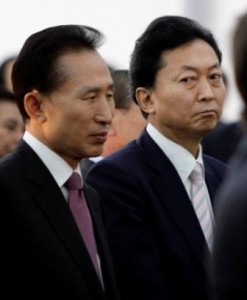What is Lee Myung-bak Doing That I’m Not?
More on:

President Lee Myung-bak did steal the spotlight last week at the Nuclear Security Summit, even though I argued strenuously that it was Japan’s Moment to Shine. Sigh. So South Korea is the favorite Asian ally. And yes, I will admit to being somewhat jealous that it wasn’t my Asian ally sitting next to President Obama. My friends who are South Korean experts were clearly tickled on Tuesday judging from the emails I received. One sent me a note saying it was hard for Japan to shine since Lee Myung-bak was “hogging the spotlight”!
Only several years ago it was the mention of the US-ROK alliance that evoked dismay and disgruntlement here in DC. Japan was being praised for “stepping up” and sending SDF to Iraq, etc. The discomfited relationship between Japan’s new Prime Minister, Yukio Hatoyama, and the Obama Administration is quite striking in contrast. For reasons both lamentable and unclear, even snarky columnists seem to be launching personal attacks toward Tokyo.
Let’s give credit where credit is due, however. The skilled President Lee Myung-bak seems to have catapulted his country into a top spot on the U.S. favorite partner list. Despite the deeply difficult domestic politics that confront the South Korean President regarding the undone KORUS trade agreement, he has positioned himself well on virtually every issue that President Obama cares about. Last fall, when Afghanistan’s stability was the top item on Obama’s agenda, President Lee promised to send a South Korean PRT there to contribute. When Obama visited Asia, Lee poured on the personal charm coupled with some very strategic thinking in his intimate conversation with Obama on the problem-solving opportunities ahead.
And yes, this past week, when I had so hoped Japan would step up at a venue where it has so much to offer, it was Lee Myung-bak who offered to host the next Nuclear Security Summit. Should I mention at this point that South Korea will host the G-20 meeting the day or two before Japan hosts APEC in the fall? Watch out Tokyo, it is not Beijing that is eclipsing Tokyo – it is Seoul.
Two points here are important to those in Tokyo watching Washington. The first is that the Lee Myung-bak example magnifies what is missing in our relationship with Tokyo at the moment. As we haggle over Futenma, the U.S. and Japan are missing key opportunities to build a closer relationship. We must find a way – and Japan’s leadership must appreciate the importance – of identifying some key areas of common interest that can translate into a policy agenda that demonstrates the value of the U.S.-Japan partnership. No more words. No more talk of potentialities. We need some action over here on the U.S.-Japan alliance agenda.
The second is to appreciate the fact that the Lee Myung-bak administration did not start out well at home. He had no experience in government and came under intense fire within South Korea over his style of leadership. His decision to allow entry of U.S. beef products into the Korean market brought protestors out on the streets during the first year of his presidency. I remember visiting Seoul with CFR’s Northeast Asian Security Architecture team in the summer of 2008, and the Blue House was surrounded by barriers, thousands of police were patrolling the streets of downtown Seoul. Scott Snyder and I walked the streets during these demonstrations and wondered how long – if ever – Lee Myung-bak’s new government would take to recover.
South Korea’s president has certainly turned things around. But this story should provide some hope for Japan’s Prime Minister, and some hints.
From over here on this side of the Pacific, it is clear that President Lee has invested deeply in the new president of the United States, and he has a domestic agenda of his own that he is moving forward as well. KORUS is Lee Myung-bak’s goal, and Obama’s mention of it in the State of the Union address suggests it is on his “to do” list as well. The tensions brewing over the sinking of the South Korean ship Cheonan and what it could mean for conflict on the Korean peninsula also makes it clear how important the closeness between Lee Myung-bak and Barack Obama truly is.
Perhaps Mr. Hatoyama should sit down with President Lee to discuss the best way to get a firmer handle on Washington?
More on:
 Online Store
Online Store